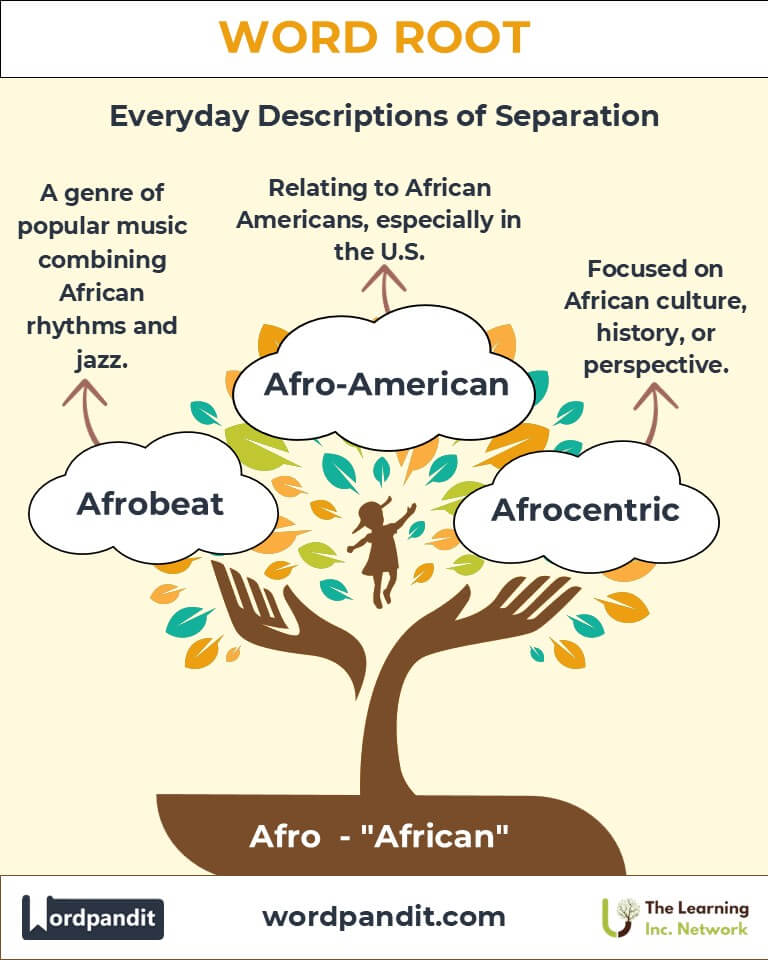Afro: Tracing the Roots of African Identity and Influence
Explore the origins, meanings, and cultural impact of the Afro root, from its African heritage to its expression in global identity, art, and language. Discover how this root has shaped perspectives in history, culture, and sociology, bridging continents and uniting people through shared ancestry.

Table of Contents
- Introduction: The Essence of Afro Identity
- Etymology and Historical Journey
- Mnemonic: Unlocking the Power of Afro
- Common Afro-Related Terms
- Afro Through Time
- Afro in Specialized Fields
- Illustrative Story: Afro in Action
- Cultural Significance of the Afro Root
- The Afro Family Tree
- FAQs About the Afro Word Root
- Test Your Knowledge: Afro Mastery Quiz
- Conclusion: The Living Legacy of Afro
1. Introduction: The Essence of Afro Identity
What does the word "Afro" evoke for you—perhaps visions of vibrant cultures, distinct hairstyles, or the rich tapestry of African heritage? Rooted in the Latin Afer, meaning "of Africa," Afro has grown beyond its geographic origins to signify a dynamic and influential identity. Pronounced "ah-froh," this root encapsulates the resilience, creativity, and unity of African cultures and their global connections.
In sociology, art, and linguistics, Afro bridges the gap between heritage and innovation. Its impact resonates in movements like Pan-Africanism, creative expressions like Afrobeat, and identities that celebrate African ancestry.

2. Etymology and Historical Journey
The word root Afro derives from Latin Afer, meaning "African" or "of Africa." In the Roman Empire, the term described people and territories of North Africa, particularly the region that is now Tunisia. Through historical migrations and colonial expansions, the root Afro evolved to represent broader African identity and its global diaspora.
In the 20th century, Afro took on symbolic meaning during the civil rights and decolonization movements. Afrocentric ideologies embraced the term to reaffirm African heritage, while Afro hairstyles became powerful symbols of pride and resistance.
3. Mnemonic: Unlocking the Power of Afro
Imagine an artist painting a vibrant mural of African culture—depicting music, traditions, and unity. The colors represent the diversity of African nations, while the mural as a whole symbolizes Afro's interconnected identity.
Mnemonic Device: “Afro is the colorful mural of African unity, painted with history, culture, and pride.”
This vivid imagery reinforces the root’s association with African heritage and its broader significance.
4. Common Afro-Related Terms
- Afrocentric (ah-froh-sen-trik): Focusing on African culture and perspectives.
- Example: "Afrocentric education emphasizes African contributions to world history."
- Afrobeat (ah-froh-beet): A musical genre blending African rhythms with jazz and funk.
- Example: "Fela Kuti is a pioneer of Afrobeat, using music to address political issues."
- Afro-Caribbean (ah-froh-kuh-rib-ee-uhn): Pertaining to African heritage in Caribbean culture.
- Example: "Afro-Caribbean festivals celebrate the fusion of African and island traditions."
- Afrofuturism (ah-froh-fyoo-chur-iz-um): A cultural aesthetic exploring African diaspora in science fiction.
- Example: "Black Panther showcases Afrofuturism by imagining an advanced African society."
- Afro-textured (ah-froh-teks-churd): Referring to the natural hair texture of people of African descent.
- Example: "Embracing Afro-textured hair is an act of cultural pride and self-love."
5. Afro Through Time
- Afro Hairstyle: The 1960s and 70s saw the Afro hairstyle symbolize resistance and pride during civil rights struggles.
- It evolved from a natural hairstyle to a political statement of African identity.
- Afrocentrism: Originating in the late 20th century, this intellectual movement highlights African influence in world history, countering Eurocentric narratives.
6. Afro in Specialized Fields
- Music and Art:
- Afrobeat and Afrofuturism have transformed creative landscapes, blending traditional African elements with modern innovation.
- Example: Artists like Burna Boy and novels like Kindred celebrate Afro heritage through diverse mediums.
- Sociology: Afrocentric theories influence the study of identity, diaspora, and postcolonialism, emphasizing African contributions to global culture.
- Fashion: The Afro aesthetic inspires bold, colorful designs that honor African traditions while setting global trends.
- Example: Ankara fabric patterns feature prominently in modern Afro-inspired fashion collections.
- Education: Afrocentric curricula reshape learning, teaching students about African civilizations and their impact on global history.
7. Illustrative Story: Afro in Action
Dr. Lila, a cultural historian, was tasked with curating an exhibit on the influence of African art in global movements. Inspired by Afrocentric principles, she traced motifs from ancient Nok sculptures to contemporary works. One discovery—an 18th-century mask—proved Africa’s aesthetic influence on early European modernism. Through this exhibit, Dr. Lila not only bridged continents but also inspired pride in African heritage, showing visitors how Afro identity thrives in art and culture.
8. Cultural Significance of the Afro Root
From the vibrant Afrobeat genre to the bold Afro hairstyle, this root embodies resilience and celebration of African identity. Its global cultural resonance connects people of African descent and influences broader societal narratives about heritage, innovation, and unity. Movements like Black Lives Matter continue to use Afro symbolism to champion justice and equality.

9. The Afro Family Tree
- Afr (Afer, Latin): Referring to Africa or African.
- Example: African, Africana.
- Ethio (Aithiops, Greek): Related to Ethiopia, historically symbolizing the "land of the burnt face."
- Example: Ethiopian.
- Nub (Nubia, Egyptian): Linked to Nubia, an ancient African kingdom.
- Example: Nubian, Nubia.
10. FAQs About the Afro Word Root
Q: What does Afro mean, and how is it used?
A: Afro signifies "African" or "of African origin." It is commonly used to describe cultural, historical, and aesthetic elements tied to African identity, such as Afro music, Afrocentric movements, and Afro-textured hair.
Q: What is the origin of the term Afro?
A: The term comes from the Latin Afer, meaning "of Africa." Over centuries, it evolved to encompass the broader African identity, particularly during the 20th century's cultural movements.
Q: Why is Afrocentric education important?
A: Afrocentric education highlights the contributions of African civilizations to world history, offering a more balanced narrative and countering Eurocentric biases in traditional curricula.
Q: What does the Afro hairstyle symbolize?
A: The Afro hairstyle became a powerful cultural symbol during the 1960s civil rights movement, representing pride in African heritage and resistance against Eurocentric beauty norms.
Q: How does Afrofuturism relate to the Afro root?
A: Afrofuturism combines African culture and history with futuristic and science fiction elements, reimagining the African diaspora's role in technology and storytelling.
Q: What is Afrobeat, and why is it significant?
A: Afrobeat is a music genre that blends African rhythms with jazz and funk. It is significant for its cultural expression and its use as a medium for addressing social and political issues.
11. Test Your Knowledge: Afro Word Root Quiz
1. What does the root Afro signify?
2. Which movement prominently uses Afro symbolism?
3. What does Afrobeat blend?
4. What term describes Africa’s influence in futuristic art?
5. Why is Afro-textured hair culturally significant?

12. Conclusion: The Living Legacy of Afro
The Afro root embodies the rich tapestry of African identity and global influence. From historical symbols to modern movements, it continues to shape perceptions of heritage, innovation, and unity. As Afrocentric perspectives gain momentum, they remind us of Africa’s enduring impact on the world. Celebrating this root fosters inclusivity and deepens our appreciation of a shared human journey.











